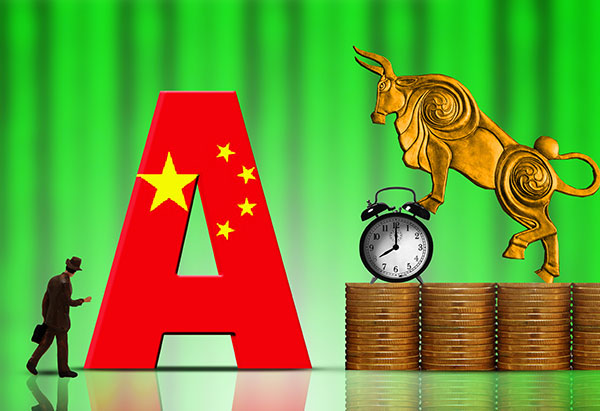Stock market volatility is normal
Updated: 2015-08-10 07:23
By Giles Chance(China Daily)
|
|||||||||||
 |
Government should focus on setting fair rules and make sure they are followed
When I became involved with China, in the late 1980s, Western media coverage of the country was small, and was aimed largely at Sinophiles with an interest in Chinese history. Naturally, the past 25 years have witnessed a tremendous increase in worldwide interest in China, as the country has risen to economic superpower status. But most of the new media coverage has not been accompanied by a corresponding increase in understanding. Almost every day, one can read columns and watch programs that seem to refer to China as if the country were on another planet.
Since 2014, international media coverage has focused increasingly on the volatile performance of the Chinese mainland's two stock markets, in Shanghai and Shenzhen, which rose between July 15, 2014 and June 12, 2015 by 150 percent in Shanghai and 185 percent in Shenzhen. They then fell in Shanghai over the next 21 days by 29 percent, and by 40 percent in Shenzhen, before recovering to close on July 15 this year, up 3 percent and 9 percent respectively, from the June low.
The behavior of the Chinese stock market seems to be more like a casino in Macao than a respected and important financial institution. Much of the media comment has perceived this extreme market volatility as another straw in the wind signaling the long-awaited China crash. Does the behavior of China's stock markets really mean this?
In October 1987, I was working as a fund manager based in London, responsible (with my colleagues) for several billion dollars' worth of investments denominated in major international currencies. Oct 19, 1987, a day known as Black Monday, is a date that no one working in the market at that time will forget. The US stock market fell by about 25 percent in the morning. This puts the recent volatility in Chinese markets into context. The dollar collapsed in value. Bond markets soared, as investors rushed from risky equities to the relative safety of debt obligations issued by the US government. Riskier stock markets in emerging economies were hit hard. The losses on the Hong Kong stock market were so large that the market closed for a week. Investors in Hong Kong stocks were unable to trade, and suffered severe losses when the market eventually reopened.
But by January 1988, the stock market in New York had started to recover and confidence began to flood back, as investors began to worry more about missing out on rising prices than about losing money as prices fell.
The reason for Black Monday in 1987 was that, after a long period of economic expansion, consumer price inflation had started to rise. In February 1987, the Federal Reserve under Alan Greenspan had started to tighten monetary policy to contain consumer price increases. Financial securities, which are denominated in money, are highly sensitive to the cost and supply of money, and therefore to changes in interest rates.
Again in 1994, the markets fell sharply, as investors in the US and Europe anticipated an economic crash that never came. And in 2005 and 2006, the markets in the US and Europe continued to soar, as economists from the Bank of International Settlements, and others, warned against the dangerously imbalanced state of the world economy. When the market crash arrived, in October 2008, most professional investors were caught out.
The record of the securities markets (stocks, bonds, etc.) in predicting or explaining developments in the real economy is patchy. Securities markets are influenced more by the availability and cost of money, or by perceptions of extreme events, than by what is happening in the real world. Changes in the supply of money may be related to significant developments in the real economy. But this relationship, between the money supply on the one hand, and what is happening to output and productivity in factories and offices on the other, is unclear and constantly changing.
Against this background, let us turn to the recent volatility in China's stock markets, and its relationship to the Chinese real economy. After a boom that ended in 2008, nothing happened for several years in China's stock markets. Suddenly in mid-2014, as the Chinese economy slowed, they took off, driven by the wealth which has accumulated in China since 2000 from huge increases in the price of Chinese real estate, and from successful private enterprise. The greater market volatility in the Shenzhen market, as against Shanghai, is partly the consequence of the large fortunes accumulated in southern China from the economic activity associated with China's export boom.
By 2014 it had become obvious that the Chinese government was determined to cool down the real estate market. Since 2013, the regular annual price increases which had made Chinese real estate investors wealthy had turned to price falls. Chinese investors fled from real estate, looked around for another market to invest their money, and found the stock market.
At a mid-July conference in New York for institutional investors organized by CNBC, Mary Erdoes, chief executive officer of JPMorgan Asset Management, said that China's equities markets don't reflect the economy. "It's been 25 years of 7 percent growth," said Erdoes. "No other country has displayed that. Not even the US. There's a lot going on in the economy and it's completely disassociated with the stock market."
The stock market plays a vital role in an efficient economy, because it brings private capital to investment in enterprises. Undoubtedly though, stock markets, by their nature, are speculative. Investment involves uncertainty, because it's about the future which is, by definition, unknowable.
Risk cannot be removed from investment. Markets are volatile, because investors are constantly reassessing the facts as they occur, and prices go up and down. The stock market is made up of a large collection of individuals, all of whom have their fears and hopes about what the future holds, as well as their individual preferences about how much to save, and for how long.
It's better to allow this collection of individuals-the market-to express themselves freely, rather than interfere to force market prices to levels that might appear reasonable, even when price volatility appears extreme. Government interference in the stock market creates another large new investment risk, because traders don't know when and how large the market interference will be. Market prices become less reliable, and many investors may cease to trade because they feel that the government's involvement is unpredictable.
It is better for the government to concentrate on setting fair, transparent rules for the market, including the participation of short-sellers and derivative traders, and making sure these rules are observed, than involving itself in setting prices. The Party recognized this market principle when it announced in November 2013, during the Third Plenum, that the market would be allowed to play "a decisive role" in the economy.
Stock market volatility in a strong emerging economy like China is to be expected, because wealth is accumulating quickly as the economy grows and develops. The media commentators who equate China's stock market volatility with an economic collapse are no more correct than if they were using the stock market to predict weather patterns, or weather patterns to predict the stock market. Stock market volatility is normal. What matters in China today, in economic terms, is productivity growth. The government should focus on establishing economic and social conditions in China that encourage innovation and free, fair competition to flourish. Its involvement in the market should focus on improving the way it operates, not whether prices rise or fall.
The author is a visiting professor at Guanghua School of Management, Peking University. The views do not necessarily reflect those of China Daily.
Related Stories
China stocks close lower on Friday 2015-07-31 15:49
Investors' antics at stock market slump 2015-07-31 15:42
Stock indexes decline on selling pressure 2015-07-31 13:51
Stocks edge down as turnover halves from its peak 2015-07-30 16:05
China's efforts to stabilize stock market pay off: experts 2015-07-30 14:37
Today's Top News
China rejects Philippine, Japanese, US claims on S. China Sea issue
MH370 passengers' families want more answers
'New Suez Canal' opened
for ship traffic
Trump won't rule out third-party run
China asks further probe into MH370
China's property taxes coming soon
Seven arrested for trafficking women into sex slavery in China
ROK's ex-first lady begins
DPRK visit
Hot Topics
Lunar probe , China growth forecasts, Emission rules get tougher, China seen through 'colored lens', International board,
Editor's Picks

|

|

|

|

|

|






